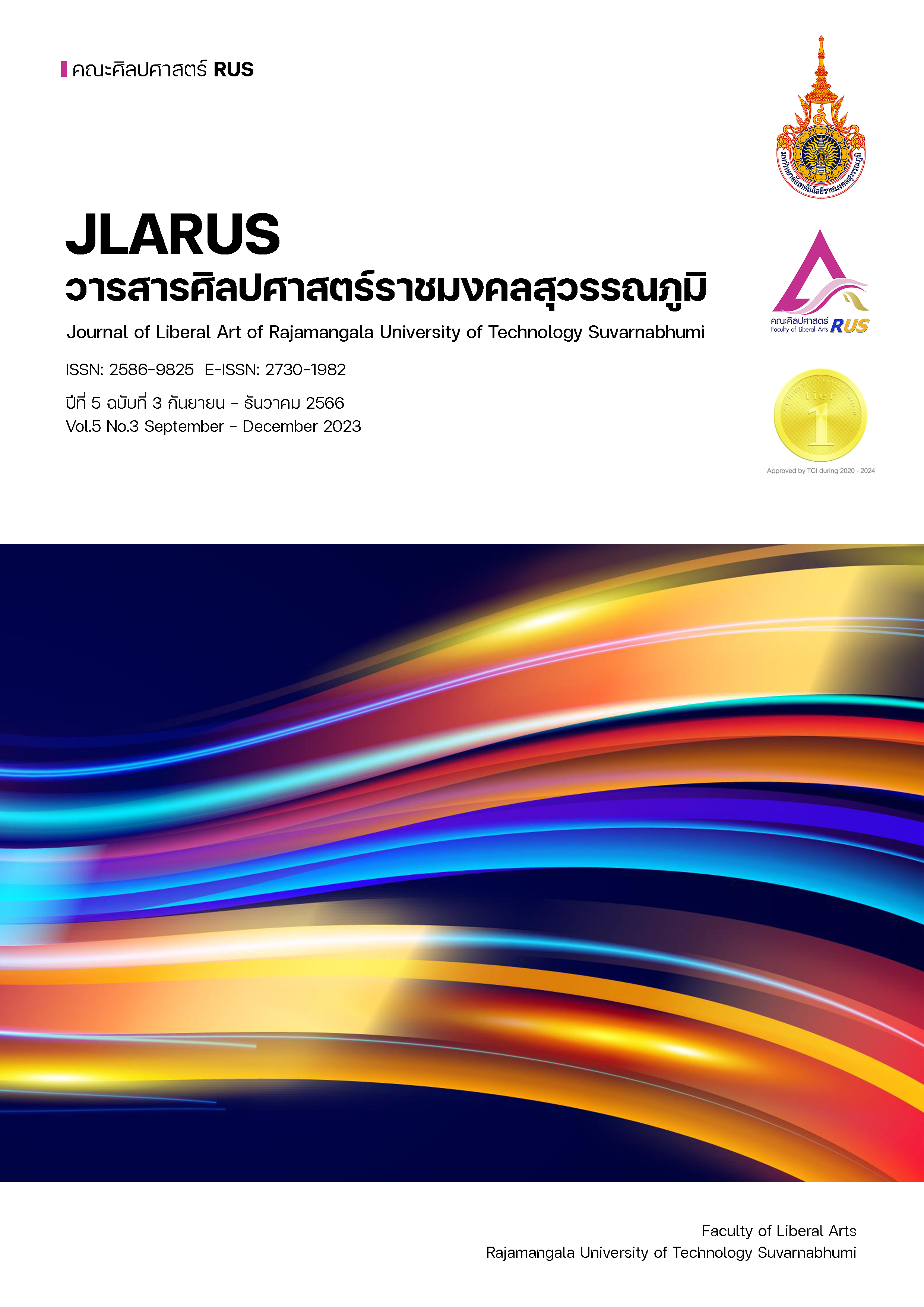DEVELOPMENT OF LOCAL CURRICULUM ON FOLK WISDOM OF THE CENTRAL REGION BY APPLYING ROYAL SCIENCE FOR LIFELONG LEARNONG WITH DIGITAL TECHNOLOGY : CASE STUDY OF ANG THONG PROVINCE
Main Article Content
Abstract
The objectives of this research are 1) to develop a local curriculum on folk wisdom in the Central Region 2) To conduct online training on the use of the curriculum. To administrators and teachers responsible for teaching and learning 3) To follow up on the implementation of the curriculum through the online system from access to learning and 4) to evaluate the use of curriculum development This research study was conducted in the form of research and development The target group includes schools in Ang Thong provinces, 23 schools in grades M.1-M.6, numbering 1,500 - 2,000 people The tools used in this research study This includes 3 Central Region folk wisdom courses 3 sets of vocational skills assessment forms Attitude assessment towards the curriculum. Qualitative data analysis used content analysis. Statistics used include percentages, averages, and standard deviations. The research results found that 1) Results of curriculum development A curriculum in Ang Thong provinces has been developed By developing a participatory curriculum Got 3 courses. 2) Results of online training and using the curriculum There are more than 20 participating schools and more than 1,500 students studying in the system 3) Results of following up on the implementation of the curriculum through the online system. It was found that every school has the following steps: (1) plan the implementation of the curriculum (2) hold a meeting to explain to those involved in using the curriculum (3) inform students to use it in learning according to the goals (4) summarize the results of the evaluation. Take the curriculum and distribute it to the public and 4) results of evaluating the use of curriculum development. The overall performance results at the end of using the curriculum were at a high level ( = 4.49, S.D. = 0.36)
Article Details

This work is licensed under a Creative Commons Attribution-NonCommercial-NoDerivatives 4.0 International License.
References
เฉลียว บุรีภักดี และคณะ. (2545). ชุดวิชาการวิจัยชุมชน ชุดการเรียนรู้ด้วยตนเอง. หลักสูตรประกาศนียบัตร บัณฑิตการจัดการและประเมินโครงการ. นนทบุรี: เอส อาร์ พริ้นติ้ง แมสโปรดักส์.
ชนกฤต มิตรสงเคราะห์. (2564). หลักสูตรท้องถิ่นภูมิปัญญาพื้นบ้านภาคกลางโดยประยุกต์ใช้ศาสตร์พระราชาเพื่อการเรียนรู้ตลอดชีวิตด้วยระบบเทคโนโลยีดิจิทัล. สืบค้น 2 สิงหาคม 2565. จาก https://cklled-kru.com/index.php.
นงนุช อินทรโคกสูง, ทินกร ชอัมพงษ์, และเยาวเรศ ภักดีจิตร. (2565). ปัจจัยที่ส่งผลต่อการบริหารงานวิชาการของโรงเรียน สังกัดสำนักงานเขตพื้นที่ การศึกษามัธยมศึกษานครสวรรค์. วารสารวิจัยวิชาการ, 5(5), 235-350.
ผดุงชัย ภูพัฒน์ และคณะ. (2561). การพัฒนาตัวชี้วัดประสิทธิภาพการจัดการเรียนรู้ของสถานศึกษาระดับการศึกษาขั้นพื้นฐาน. กรุงเทพมหานคร: สำนักพิมพ์ พริกหวาน จำกัด.
วิจารณ์พานิช. (2555). วิถีสร้างการเรียนรู้เพื่อศิษย์ในศตวรรษที่21. กรุงเทพมหานคร: มูลนิธิสดศรีสฤษด์วิงศ์.
วิชัย วงษ์ใหญ่. (2537). กระบวนการพัฒนาหลักสูตรและการเรียนการสอนภาคปฏิบัติ. กรุงเทพมหานคร: สุวิริยาสาส์น.
สงัด อุทรานันท์. (2532). พื้นฐานและหลักการพัฒนาหลักสูตร. กรุงเทพมหานคร: มิตรสหาย.
สามารถ จันทร์สูรย์. (2534). ภูมิปัญญาท้องถิ่นคืออะไร อย่างไรในการสัมมนาทางวิชาการเรื่องภูมิปัญญาชาวบ้าน. กรุงเทพมหานคร: คุรุสภาลาดพร้าว.
อุทัย บุญประเสริฐ. (2542). การศึกษาแนวทางการบริหารและการจัดการศึกษาของสถานศึกษาในรูปแบบการบริหารโดยใช้โรงเรียนเป็นฐาน. กรุงเทพมหานคร: โครงการวิจัยภายใต้การสนับสนุน ของสำนักงานคณะกรรมการการศึกษาแห่งชาติ สำนักนายกรัฐมนตรี.
เอกวิทย ณ ถลาง. (2546). ภูมิปัญญาท้องถิ่นกับการจัดการความรู้. กรุงเทพมหานคร: อมรินทร.
Cronbach, L. J. (1963). Course improvement through evaluation. Teachers college record, 64(8), 1-13.
Good, C. V., & Merkel, W. R. (1973). Dictionary of education. New York: McGraw-Hill.
Hilgard, E.R., Atkinson, R. C. & Atkinson, R. L. (1971). Introduction to Psychology. New York: Harcourt Brace Jovanovich.
Klomim, K. (2019). A Training Curriculum Development on Introduction STEM with Integrated King's Science Education for Primary Teachers. Humanities, Social Sciences, and Arts, 12(1), 1391-1413.
Likert, R. (1967). The human organization: its management and values. New York: McGraw-Hill.
Parkay, F. W., & Hass, G. (1999). Curriculum planning: A contemporary approach. Boston: Allyn and Bacon.
Sakworawit, A. (2017). Understaning, Conneting, Developing: King’s Science for Sustainability Management. Retireved December 10, 202. form https://mgron line.com/daily/detail/ 9600000103010.
Taba, H. (1962). Curriculum development: Theory and practice. New York: Harcourt, Brace & World.
Tyler, R. W. (1949). Basic principles of curriculum and instruction. Chicago: University of Chicago press.
William, E. (1976). Electoral Participation in a Low Stimulus Election. Rural Development. 4(1), 111–124.


